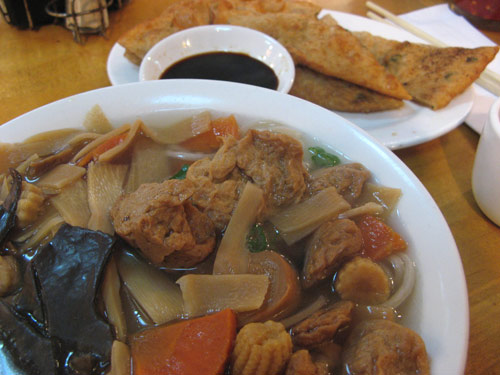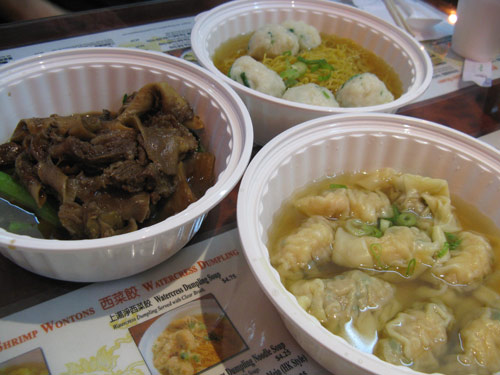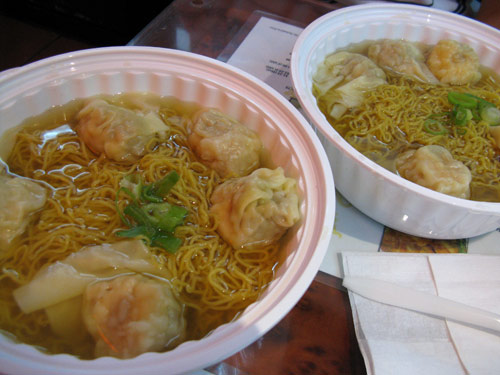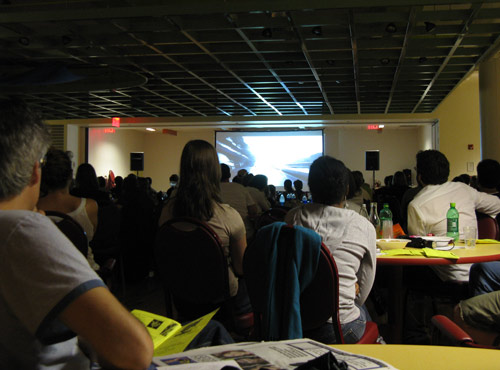Tag: noodles
Noodle discovery
Tropical storm Hannah blew in late this afternoon, dumping 3-4 inches of rain onto the city in a matter of hours, flooding the streets of Flushing and halting play at the U.S. Tennis Open Tournament nearby.
At the corner of Prince Street and Roosevelt Avenue sits Sifu Chio, an unassuming restaurant which my parents introduced to me as one of the best places in town to get a bowl of authentic Hong Kong-style wonton noodles – a simple thing, done very well. (Chowhounds like the dumplings.) The restaurant isn’t quite a dive, but the aesthetic is rather plain and utilitarian: open kitchen, florescent lights overhead, menus on the table under glass and every dish served in disposable plasticware. We were the only ones in the shop this evening, probably owing in no small part to the river of wretched rainwater coursing along the sidewalk in front.
What had started out as an order of a few bowls of wonton noodles expanded to include a side of Chinese beef brisket, a dish of Chinese broccoli, a bowl of noodles and fish balls, and a bowl of shrimp watercress dumplings. As the driving rain pounded against the darkened windows, we eagerly scarfed down every bite.
Hard to pinpoint precisely what sets these noodles apart from the hundreds of other bowls I’ve eaten over the years. Dumplings made to order — delicate, tender skins with deliciously fresh filling — are certainly one factor. Mostly, I think, it’s the perfectly textured noodles. In Cantonese, the word to describe them is “song,” a wonderful adjective which has no true English equivalent. Song can be used to describe a bitingly crisp wedge of fruit, a firm yet succulent shrimp, or here, snappy, springy noodles. Al dente in this context comes close, I suppose, but doesn’t quite get to the heart of the irresistibly pleasurable sensation: of tooth meeting initial resistance, then bursting through to tender, juicy center. “Toothsome” (definition 2) is the best general English translation, though I find it lacking in the poetry of “song“.
Later that night, the second annual Sunnyside Shorts Film Festival, which had been scheduled to take place at The Sunnyside Gardens Park, was driven indoors to the newly inaugurated Sunnyside Senior Center at Sunnyside Community Services (Note to self: 39th Street — not the same as 39th Place. A girl raised in Queens should know this. I plead temporary rain-blindness.)
We sat at round formica-topped tables to watch the 16 submissions by filmmakers hailing predominantly from New York — among them a few Sunnyside locals — with contributions from Europe and South America. Several of the short films were set in New York City, and covered an array of genres: animation, documentaries, comedic skits, one painfully earnest teen film student exercise, a sock puppet music video…
Quality varied widely. My favorite was Yolanda Pividal’s 16-minute “Two Dollar Dance” — a poignant examination of the Latino clubs dotted along Roosevelt Avenue in Jackson Heights where a clientele of immigrant men, isolated from mainstream society, gather in the evening to pay for female companionship, if only for the duration of a song — an update of the “dime a dance” girls of the taxi-dance halls of the 20s and 30s. (Unsurprisingly, the workers at these places are often exploited.)
But as credits rolled on the experimental “interpretive dance” short (oof), I discreetly slipped out with SH and AP, in search of the less challenging pleasures of frozen yogurt: green tea and blood orange for me.
Stuff Korean people like
For lunch at Marco Polo Noodle Shop this afternoon, I ordered the Buddha’s Delight. (Somehow, it seems we’ve become regulars at this restaurant on Baxter.) The version served here is very different from the dish at Amazing 66 — less a stew than a thrown together assortment of sliced vegetables and canned items over fresh noodles: bamboo shoots, baby corn and fried gluten, sometimes seen in Asian markets as “vegetarian duck,” “vegetarian chicken” or seitan.

SYB, of course, ordered his usual: Noodles with Peking Sauce. During the post-lunch chat with our waiter, it came up that this Northern Chinese dish is a favorite among Koreans for its similarity to “Ja Jyang Myeon.” That Korean dish derives its name from the phonetic translation of the Chinese “Zha Jiang Mian” (literally, “fried sauce noodles”). The Korean version of Peking Noodles is darker, pastier, more vinegary, and according to my friend, made with shredded zucchini.
In Korea, Ja Jang Myeon is traditionally eaten on “Black Day.” On April 14, one of a whole slew of love-related 14th day celebrations, those without significant others gather around bowls of comforting dark-sauced noodles to wallow in their singledom… which I suppose makes it the Korean equivalent of Ben & Jerry’s.
| S | M | T | W | T | F | S |
|---|---|---|---|---|---|---|
| 1 | 2 | 3 | 4 | 5 | 6 | |
| 7 | 8 | 9 | 10 | 11 | 12 | 13 |
| 14 | 15 | 16 | 17 | 18 | 19 | 20 |
| 21 | 22 | 23 | 24 | 25 | 26 | 27 |
| 28 | 29 | 30 | 31 | |||
Search
Popular Tags
Categories
Archive
- July 2010
- July 2009
- January 2009
- November 2008
- September 2008
- August 2008
- July 2008
- June 2008
- May 2008
- April 2008
- March 2008
- February 2008
- January 2008
- December 2007
- November 2007
- October 2007
- September 2007
- August 2007
- July 2007
- June 2007
- May 2007
- April 2007
- March 2007
- February 2007
- January 2007
- December 2006
- November 2006
- October 2006
- September 2006
- August 2006
- July 2006
- June 2006


